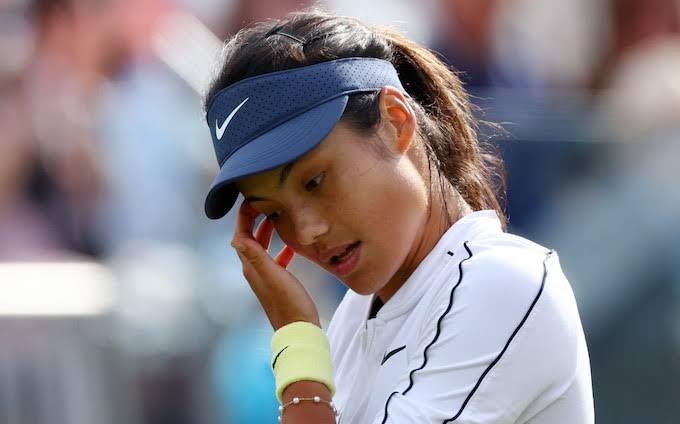Emma Raducanu finds positive spin after she is blown away at Eastbourne

An upbeat Emma Raducanu told reporters that “you have to just spin everything to be a positive” as she made a wind-assisted exit from the Eastbourne quarter-finals. After balmy conditions on the south coast in the early part of this week, the wind suddenly approached gale force on Thursday. And these conditions were hardly ideal for playing against a resourceful defender like Daria Kasatkina.
Towards the end of her 6-2, 6-2 defeat, Raducanu was so baffled by some of the odd bounces and bendy trajectories that she could not help laughing at her own incapacity to time the ball. Even afterwards, she remained disarmingly cheery. “Losing today means I get a day off tomorrow and then get to train at Wimbledon,” she said. “For me, that’s how I’m going to spin it right now.
“I think I put some good level out again [in Eastbourne],” she added. “Just to be able to back up a week like Nottingham, I’m very happy.
“I think the biggest win for me is I was able to play three matches back to back. Today physically I actually felt fine. It [the defeat] wasn’t to do with being in pain [even though] yesterday the match was close to three hours. Plus the warm-up before, I played almost four hours on court, and this morning I pulled up completely fine. I mean, I was surprised about it. That’s a big positive.”
Raducanu can go to Wimbledon in decent spirits after claiming her first-ever top-ten scalp on Wednesday: a 4-6, 7-6, 7-5 victory over Jessica Pegula, the second seed and world No 5. Yet these sorts of tournaments don’t get any easier as you progress. Kasatkina is also high up the world rankings at No 14, and her varied repertoire of shots was perfectly adapted to Thursday’s weird and not-so-wonderful conditions.
As it happens, each of the three British women in the Eastbourne quarter-finals came up against skilful and diminutive manipulators of a tennis ball. First Leylah Fernandez took out Harriet Dart, then Jasmine Paolini defeated Katie Boulter, and finally it was Raducanu’s turn. As the BBC’s analyst Naomi Broady pointed out afterwards, the home hopes would probably have preferred to be facing big-hitters on an awkward day like this. Instead, the dice fell unfavourably and all three women lost in straight sets. For Dart, the picture was complicated by the large plaster she was forced to wear on her knee after she had slipped and fallen in Wednesday’s second-round match.
Returning to Raducanu, she acknowledged after the match that she was overly stubborn in sticking to her regular game-plan in the face of unusual circumstances. “My plan was to play my identity of tennis, which is aggressive, which is taking the ball early,” said Raducanu. “Yesterday [against Pegula] it was a much better level of tennis because conditions suited it better. It was just more clean ball-striking.
“Today it was the complete opposite. It was more about the scrappy little shots that are dying. The slower you actually hit the ball today, the more difficult it was to deal with, because it would just hold in the air and move and cut with all the spin. “If [only] I had the confidence to just, like, chip some back, scrape some back, throw some up high, be a little bit more patient in the rallies, not try and hit the ball very close to the line, because the wind would take it out.
“I thought I was very stubborn in the wrong way out there. Stubborn is one of my character traits. Sometimes it works for me, but sometimes it works against me. So I think that’s just part of me maturing as a tennis player too.” Boulter’s story was similar, except that there would have been little point in her trying to mix up her game, as she really needs to play first-strike tennis. She has more weapons than Raducanu, but fewer defensive attributes – and it helps to be able to defend well when you play in the wind.
“It was very, very tricky today,” said Boulter after her 6-1, 7-6 loss to the recent French Open finalist Jasmie Paolini. “I don’t think it was about how you hit your forehand or how you hit your backhand. It was a bit of a mental game and trying to stay calm in the wind.”
The one British winner of the day at Eastbourne came in the men’s event. Billy Harris started this grass-court season outside the world’s top 200, but a sequence of 11 wins in 14 matches has carried him up almost 90 places already, with power to add if he can overcome Australia’s Max Purcell in Friday’s semi-final.
“We used to play a lot in the wind,” said Harries after his 6-7, 7-6, 6-2 comeback win over Flavio Cobolli. “It’s obviously frustrating for everyone but coming from the Isle of Man definitely helped me today.”
And there was more good news from Majorca, where Paul Jubb reached his first ATP semi-final by overcoming the touted American prospect Ben Shelton in three sets.
“I just kept getting better and better throughout the match,” said Jubb, who has also climbed nearly 100 places this week to the verge of the top 200. “I’m super, super happy. Last year was so tough, injured most of the year. This is one of those visions I’ve had in my mind, being on this stage, and now I’m here and I’ve done it.”



